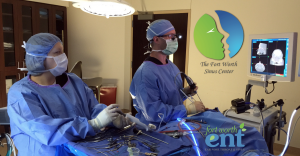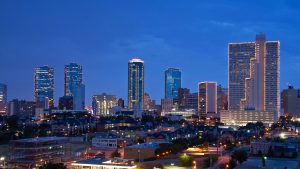After endoscopic nasal polyp surgery, you may feel groggy from the general anesthetic used during the procedure, so you should plan for someone to drive you home. Your nose will be bandaged, as some blood and oozing from the nasal passages is normal. Some patients experience this drainage for a day or two, while others may have drainage for a week. Bandages may need to be changed frequently during this time. Complete recovery from nasal polyp surgery is approximately 2 weeks in most cases. 
Nasal Polyp Surgery Recovery Tips
- You may experience some mild discomfort or pain after your nasal polyp surgery. Your ENT surgeon will prescribe you pain medication, if necessary, or advise you on appropriate over-the-counter pain relievers. Take only what your doctor recommends, as some over-the-counter medications may not be advisable.
- Congestion and clotting in the nasal passages can make you feel as if you have a bad cold for a few days. Be sure not to blow your nose for the first 2 weeks after your nasal polyp surgery. After 14 days, gentle blowing is recommended for a time.
- Avoid hot baths and drinking hot liquids, as these can promote nasal bleeding.
- Do not smoke. Smoking can increase polyp recurrence and delay healing. Avoid being in environments where you would be exposed to excessive smoke, dust, or other pollutants.
- Sleep with your head elevated.
- For the first week, avoid bending down or looking down for long periods of time because this can cause pressure within the nose.
- Do not perform strenuous exercise until your ENT surgeon releases you to do so.
- Use saline flushes to wash out clots and prevent excessive crust formation.
- Avoid alcohol consumption for 2 weeks after nasal polyp surgery since alcohol can thin the blood and contribute to nosebleeds.
Your doctor will provide you with detailed instructions on how to clean your nose and minimize nasal bleeding, as well as what to do in the event of a nosebleed (which is not uncommon during nasal healing). Most patients experience easier breathing shortly after nasal polyp surgery. Follow-up appointments are usually recommended every week or two for about 6 weeks. During these visits, your doctor can monitor the healing process and remove any crust from the nose (debridement). Your ENT will also counsel you on methods to help prevent nasal polyps from recurring. If you have been diagnosed with nasal polyps or your current treatment is not relieving your nasal polyp symptoms, contact the ENT specialists at Ft. Worth ENT for an evaluation. Our physicians here at Fort Worth ENT & Sinus are here to help. To make an appointment with one of our ear, nose, and throat specialists, call 817-332-8848 or request an appointment online today.


